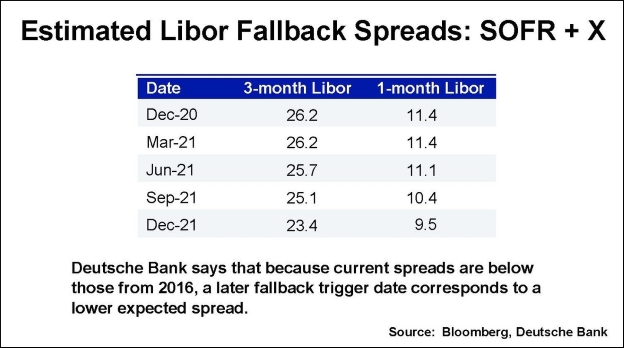
Preparing for fallback language that could be triggered when a UK regulator deems Libor non-representative.
The global pandemic has not slowed the march toward Libor’s demise, scheduled for the end of 2021. And corporates have a lot to do long before then.
- Just last week, ISDA launched a fallback supplement and protocol, marking what it called a “major step” in reducing the impact of Libor becoming unavailable “while market participants continue to have exposure” to it.
- The supplement includes “robust fallbacks for derivatives linked to certain [interbank offered rates],” and the protocol lets participants incorporate the changes into legacy “non-cleared derivatives trades with other counterparties that choose to adhere to the protocol,” according to ISDA.
The FCA and fallback triggers. At a recent meeting of NeuGroup for Capital Markets sponsored by Deutsche Bank, members heard Matthew Tilove, the bank’s co-head of risk management solutions, say that the UK Financial Conduct Authority (FCA), the administrator for Libor, could determine that Libor is “non-representative” before the end of 2021.
- In a follow-up interview, Mr. Tilove said, “Under the ISDA fallbacks protocol, as well as under the ARRC-recommended fallback language for bonds and loans, such a determination could trigger the fallback to SOFR-based rates, even though Libor continues to published.”
- He noted that earlier this year, FCA officials indicated a non-representative announcement could come as early as the end of 2020; the ISDA fallbacks supplement and protocol become effective on Jan. 25, 2021.
- The law firm Michael Best & Friedrich observed that Libor-based derivatives contracts executed on and after Jan. 25 that incorporate 2006 ISDA definitions “will automatically be replaced by term-adjusted SOFR plus a spread when [Intercontinental Exchange] permanently stops publishing Libor, or when Libor is deemed to be ‘non-representative’ by the FCA.”

Preparedness. “Companies may need to be operationally ready to support SOFR-linked contracts, including daily compounding and resets in arrears, long before the end of 2021,” Mr. Tilove said, referring to the Secured Overnight Financing Rate endorsed by the Federal Reserve and the Alternative Rates Reference Committee (ARRC).
- “Companies should also review their existing hedge relationships to identify potential situations where the hedge and the hedged item may be subject to differing fallback provisions,” he added.
Worst case scenarios. Other risk management experts told NeuGroup Insights that if documentation is in place and contracts fall back to SOFR-based rates, most of the very worst outcomes can be avoided. However:
- If documentation is not in place, so that ISDAs, bonds and loans do not include suitable fallback provisions, the potential risks include a breakdown of economic terms and disputes with counterparties, including litigation.
- If corporates are not prepared operationally to deal with the fallback rates, including daily resets and fixings in arrears, unfavorable outcomes include operational payment errors (and resulting reputational and legal risks), potential cash flow forecasting errors, accounting errors for interest accruals, lots of operational time and effort spent monitoring and fixing things.
- If corporates do not adequately understand the economics of the various fallback provisions, possible problems include introducing mismatches in hedging relationships because of differences between the way the fallbacks apply to the hedge and the hedged item.
- For example, a floating-rate note might fall back to term SOFR set in advance while the swap falls back to daily compounded SOFR set in arrears, introducing some risk between those two fixings.


